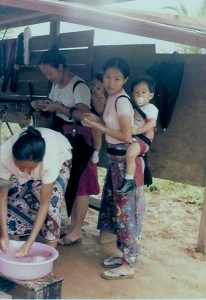Closing the Jungle Book
/We were winding up our sojourn in French Guiana. With the $5,000 windfall bonus we earned from the Columbia University chartered trip from Fortaleza, Brazil, to St. Peter and St. Paul Rocks, plus the money we were able to save from working in Cayenne for the past seven months, we felt we had some wiggle room to head on up through the Caribbean, and eventually to the East Coast of the States. But first and foremost, we would try to see if Michel could get some medical attention for his hernia in Martinique.
After celebrating Sean's and Brendan's sixth and third birthdays respectively, (I couldn't believe that Brendan just turned the same age that Sean was when we left France three years earlier), we targeted a departure date of April 15 from Cayenne. We always set a specific date for leaving, because then we had a deadline to respect. It helped us check off the "to-do" list and get things done within a reasonable timeframe. We had met so many cruisers who said they would "leave more or less around this or that time," and then just procrastinate. One could always wait to finish up more things, but sometimes you just have to go. Things will never be perfect.
Our seven months here proved to be a good "growing" time for the boys. Brendan experienced daycare for the first time, and had a little playmate, while Sean attended a French kindergarten. Together they both experienced Cayenne's version of Carnaval, as the school children attended class one day in costume and joined a crowd down the main street in the local version of a Mardi Gras parade.
Our dear friends, the Schurmann family on Guapo, had finally left Brazil to begin their circumnavigation adventure, and we met up again when they sailed into Cayenne for a brief stay. We hadn't seen them since we left Florianopolis about a year earlier. One long holiday weekend, we all decided to trek into the jungle for a short camping trip—a two-to-three hour excursion over a very rudimentary bumpy and muddy trail—to the village of Cacao, deep within the jungle canopy. Cacao had been populated with Hmong refugees from the Vietnam War, resettled by the French government, just five years earlier. The Hmongs had transformed this forsaken plot of jungle into a fertile and vibrant agricultural oasis through an amazing dose of industriousness, determination, and ambition. Vegetables and tropical fruits abounded and flourished in neatly manicured fields alongside the traditional stilt homes they built. As they were also dressed in traditional Hmong attire, we felt transported to another time and place in Asia.
The Hmongs were already reaping financial benefits from their hard work. They would load up newly acquired Toyota pick-ups for their twice-weekly, pre-dawn trek to Cayenne's market to sell their produce. Their newfound prosperity, however, came somewhat at the expense of their relations with the local Guyanese population. The Hmongs now dominated the Cayenne market, and in retribution from the market organizers, they were relegated to the less desirable stalls outside, while the Guyanese commanded the more coveted interior marketplace spots. However, the shopping crowd gravitated to the outside, attracted by the Hmongs' more bountiful and finer produce.
The jungle swallowed us where we set up camp at a "carbet" down near a creek just outside Cacao. Carbets are basic thatched roof structures, poised over posts and rafters, and serve as rudimentary shelters—literally a simple "roof over one's head'—just to hang a hammock for the night. Throughout French Guiana, carbets seem to pop up randomly in the jungle, or are available in Indian villages for free use by travelers. With the Schurmanns, we unloaded our hammocks, food, started a fire, and cooked up a rustic dinner. When camping in these parts and climates, a sleeping bag on the ground is ill advised. There are too many strange and toxic critters with which one could unwittingly share a bed. Hammocks are the customary camping gear "de rigueur." But, nevertheless, we still had a few surprises that evening.
After we finished dining by flashlight and candlelight, everyone headed for the hammocks that Michel and Vilfredo had rigged up earlier, all tied between posts and rafters. A sudden preliminary ominous cracking sound preceded a group crash of the Couvreux family. Our posts faltered and the floor caved in below our weight. It was actually quite comical and after the initial shock and surprise, everyone was laughing. Michel and Vilfredo re-rigged the hammocks only to have the Schurmann side of the carbet do the same thing moments later. Being sailors, knowing knots and how to make-do with the materials at hand, Michel and Vilfredo were able to jury-rig the carbet for our hammocks one more time. Although we were once again settled in for the night rather comfortably, the mosquitoes, huge flying roaches, gigantic creepy-crawly poisonous centipedes ("Amazonian giant centipedes") that inched along the posts and rafters, and the umpteen stereophonic noises that echoed throughout the jungle all night long, all colluded in assuring us a sleepless night.
This was our second experience camping in a carbet with our two boys. Once during a "cross-coastal" road trip we took from Cayenne to the border of Suriname, we slept in an Indian village carbet on the shore of the St. Laurent de Maroni River, which also doubles as the border with Suriname. This "hotel" carbet was surrounded by the villager's homes, which were either also carbets, or interspersed "modern" brick and stucco dwellings. That evening the village chief graciously invited us to a tribal ceremony that was not a staged event for tourists. Later that night in our hammocks (that Michel and I each shared with one child), we were awakened in the middle of the night by a low, steady chomping sound. The tall grass was rustling just a few feet away. I was somewhat petrified and Michel whispered that he had his hand on his large knife by his side. I imagined lions and tigers and bears and then…one very big (or at least it seemed big from our nearby, horizontal viewpoint), harmless cow peered curiously at us through the grass: chomp, chomp, chomp! The next morning at sunrise, we awoke to an otherworldly tableau as many of the villagers were bathing and washing clothes in the river.
Once back in Cayenne, the Schurmanns moved on, and our April 15 deadline was nearing quickly. As it had been just about a year since we last hauled out Cowabunga for a good hull cleaning, we needed to do it again before this next trip. These warm equatorial waters were just the perfect incubator and breeding grounds for whole colonies of underwater sea creatures that loved to set up residence on our hull. Again, as several times in the past, since there was no shipyard or proper haul-out facility for pleasure boats in, or anywhere near, Cayenne, we had no choice but to employ the now-familiar "beached whale" option, the two-day scenario with the outgoing and incoming tides.
Although we had hoped to leisurely meander up through the Caribbean islands without a strict itinerary, and just let ourselves be seduced by whatever anchorages and islands we came across, it became clear that Michel needed some medical attention for his hernia. A doctor in Cayenne had diagnosed the problem, but since the general opinion was that good medical care was doubtful there, it would be best to get a second opinion and possible plan of action in Martinique. So we aimed to meander less and follow a more direct route.
Departure day came—and then went. Some inadvertently crossed electrical wires spawned an impressive cloud of black smoke just as we were lifting anchor with the windlass. Full panic on board, all systems stopped! Michel had recently installed a new wind generator, but obviously something was amiss. A few nips and tucks in the wiring here and there, and we were good to go the next day. The mobile community in the anchorage feted our departure with the traditional foghorn salute. It wasn't easy to leave all the fast friends we had made in the past seven months. It never was easy to move on, but the intrigue of the unknown always spurred us along.







